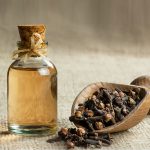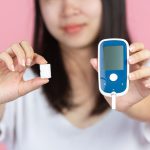Ashwagandha in Sanskrit means “smell of the horse” to correlate it with the strength of…
Read MoreAcne is a skin disorder that most of us have experienced. It’s most common in teenagers, and within this age group more common in boys than girls. Let’s take a closer look at this skin condition and how turmeric can help us deal with it.[1]InformedHealth.org [Internet]. Cologne, Germany: Institute for Quality and Efficiency in Health Care (IQWiG); 2006-. Acne: Overview. 2013 Jan 16 [Updated 2019 Sep 26].
Acne forms when small pores in our skin known as hair follicles get clogged. Our hair follicles are attached to glands known as sebaceous glands. These glands secrete sebum or oil which keep our skin and hair from getting too dry. But if excess sebum is produced it can mix with dead skin cells and plug your hair follicles causing blackheads or whiteheads to form. Bacteria that are present on the skin can infect these blocked skin pores and cause inflammation leading to the development of papules, nodules, cysts, and pustules. Therefore, the overproduction of sebum, blocked skin pores, infection by bacteria, and inflammation are the major factors that lead to the development of acne. But other factors can raise your chances of getting acne. These include:
It has also been observed that factors like exposure to pollution and humidity can worsen acne. As can stress, picking at your pimples, scrubbing your skin roughly, skin care products which block your pores, or pressure from tight clothes and helmets.[2][Acne](https://www.nhs.uk/conditions/acne/causes/ “Acne”).NHS,UK. [3][Acne](https://www.niams.nih.gov/health-topics/acne#tab-causes “Acne”).National Institutes of Health. Some research also links certain foods like cow’s milk and high glycemic foods (foods like white bread, potato chips, pastries, etc. which can cause your blood sugar to rise quickly) to the development of acne.[4]CAN THE RIGHT DIET GET RID OF ACNE?](https://www.aad.org/public/diseases/acne/causes/diet “CAN THE RIGHT DIET GET RID OF ACNE?). American Academy of Dermatology Association.
In ayurvedic manuscripts like Charaka Samhita, Ashtanga Hridaya, and Sushruta Samhita acne is known as ‘yuvanpidika’ or ‘tarunyapitika’, that is an inflammation that develops during adolescence. According to ayurveda, an aggravation of kapha dosha increases the production of skin oils which clogs your pores which results in the formation of whiteheads and blackheads. Meanwhile, an aggravation of pitta dosha results in inflammation with pus and the development of red papules (bumps). People who have a kapha-pitta dosha skin are considered to be prone to acne. Ayurvedic texts also state that lifestyle factors can promote acne. So insufficient sleep, and excessive stress, as well as frequently consuming very oily (ati snigdha), sweet (madhura ), or spicy (katu) foods can lead to acne. A decline in agni (the biological fire responsible for digestion and metabolism), excessive sun exposure, depression, anxiety, and tobacco or alcohol consumption are other factors that are thought to contribute to acne.
Turmeric is highly valued in ayurveda for its many medicinal properties. It is considered to be varnya (can improve your complexion), rujahara (can alleviate pain), dahahara (can alleviate burning sensation), and vishodhana (can cleanse the body). It has traditionally been used to treat a range of conditions such as urinary disorders, skin diseases, ulcers, worm infestations etc.[5]Sojeetra, Niral Hansrajbhai, Mital M. Buha, and Rabinarayan Acharya. “Haridra (Curcuma longa linn.) Depiction in Ayurvedic and Indian Alchemy (Rasashastra) Literature: A Classical … Continue reading Turmeric helps in balancing kapha and pitta doshas and therefore can be helpful in tackling acne.
Turmeric has been traditionally used to treat acne in Southeast Asia. So how does it work? It:
According to a study, the application of a formulation containing turmeric extracts was able to significantly reduce the secretion of skin oils or sebum. Experts suggest that turmeric does this by inhibiting an enzyme known as 5αreductase. This enzyme is responsible for hormonal changes that can enlarge your sebaceous glands leading to an increase in the secretion of sebum.[6]Zaman, S. U., and Naveed Akhtar. “Effect of turmeric (Curcuma longa Zingiberaceae) extract cream on human skin sebum secretion.” Tropical Journal of Pharmaceutical Research 12, no. 5 … Continue reading
Research shows that a compound present in turmeric known as curcumin can significantly inhibit the growth of bacteria – Propionibacterium acnes – which plays an important role in the development of inflammatory acne.[7]Liu, Chi-Hsien, and Hsin-Ying Huang. “In vitro anti-propionibacterium activity by curcumin containing vesicle system.” Chemical and Pharmaceutical Bulletin 61, no. 4 (2013): 419-425.
Inflamed acne is characterized by swelling and reddening of the skin. The bacteria Propionibacterium acnes, plays a key role in this inflammation. But research shows that turmeric has an anti-inflammatory effect and can suppress the inflammation induced by P. acnes.[8]Jain, A., and E. Basal. “Inhibition of Propionibacterium acnes-induced mediators of inflammation by Indian herbs.” Phytomedicine 10, no. 1 (2003): 34-38.
Many people get dark spots or marks after acne heals. This happens because as your inflamed skin heals it produces excess melanin. Melanin is the pigment which gives your skin color. The more melanin you have, the darker your skin gets. And this discoloration persists even after your acne has completely healed.[9]Davis, Erica C., and Valerie D. Callender. “Postinflammatory hyperpigmentation: a review of the epidemiology, clinical features, and treatment options in skin of color.” The Journal of … Continue reading But research shows that a compound present in turmeric – curcumin- can inhibit the production of melanin.[10]Tu, Cai‐Xia, Mao Lin, Shan‐Shan Lu, Xiao‐Yi Qi, Rong‐Xin Zhang, and Yun‐Ying Zhang. “Curcumin inhibits melanogenesis in human melanocytes.” Phytotherapy Research 26, no. 2 … Continue reading Therefore, it can help fade acne spots and marks. Do keep in mind though that turmeric may not be helpful if you have pitted skin or raised scarring due to acne.
Turmeric has also been found to be useful in:
Topical application of turmeric might be the best way of using it to deal with acne
2. Spice up your food with it
Some research indicates that you can get the anti-inflammatory benefits of turmeric by consuming it too.[16][Turmeric for Acne: Possible Benefits, Drawbacks, and Effectiveness](https://www.verywellhealth.com/turmeric-for-acne-and-acne-scars-4108150 “Turmeric for Acne: Possible Benefits, Drawbacks, and … Continue reading This healthy spice is commonly used in Indian cooking. So, curries, stews, soups and vegetable side dishes can be spiced with a dash of turmeric. You can even try a cup of turmeric milk or tea.
Q. Can turmeric help fade acne scars?
Yes, turmeric can help fade dark spots or marks caused by acne. However, it may not help treat severe scarring where you see pitted skin or raised scars.
Q. Can turmeric cause a breakout?
Some people, depending on their prakruti, may experience blistering, reddening, or itching of skin when they apply turmeric to their skin. Always test any new skin care ingredient on a small patch of skin before applying it to your face to make sure that you don’t react adversely to it.[20][Turmeric for Acne: Possible Benefits, Drawbacks, and Effectiveness](https://www.verywellhealth.com/turmeric-for-acne-and-acne-scars-4108150 “Turmeric for Acne: Possible Benefits, Drawbacks, and … Continue reading
Q. Can turmeric be applied on acne overnight?
Turmeric can stain your bed clothes yellow. So, it might be best to wash it off before going to bed. Also, Ayurvedic wisdom suggests that face packs should be removed after they dry out and should not be applied at night or left on overnight.
References
| ↑1 | InformedHealth.org [Internet]. Cologne, Germany: Institute for Quality and Efficiency in Health Care (IQWiG); 2006-. Acne: Overview. 2013 Jan 16 [Updated 2019 Sep 26]. |
|---|---|
| ↑2 | [Acne](https://www.nhs.uk/conditions/acne/causes/ “Acne”).NHS,UK. |
| ↑3 | [Acne](https://www.niams.nih.gov/health-topics/acne#tab-causes “Acne”).National Institutes of Health. |
| ↑4 | CAN THE RIGHT DIET GET RID OF ACNE?](https://www.aad.org/public/diseases/acne/causes/diet “CAN THE RIGHT DIET GET RID OF ACNE?). American Academy of Dermatology Association. |
| ↑5 | Sojeetra, Niral Hansrajbhai, Mital M. Buha, and Rabinarayan Acharya. “Haridra (Curcuma longa linn.) Depiction in Ayurvedic and Indian Alchemy (Rasashastra) Literature: A Classical Memoir.” Annals of Ayurvedic Medicine 8, no. 1 (2019): 32-41. |
| ↑6 | Zaman, S. U., and Naveed Akhtar. “Effect of turmeric (Curcuma longa Zingiberaceae) extract cream on human skin sebum secretion.” Tropical Journal of Pharmaceutical Research 12, no. 5 (2013): 665-669. |
| ↑7 | Liu, Chi-Hsien, and Hsin-Ying Huang. “In vitro anti-propionibacterium activity by curcumin containing vesicle system.” Chemical and Pharmaceutical Bulletin 61, no. 4 (2013): 419-425. |
| ↑8 | Jain, A., and E. Basal. “Inhibition of Propionibacterium acnes-induced mediators of inflammation by Indian herbs.” Phytomedicine 10, no. 1 (2003): 34-38. |
| ↑9 | Davis, Erica C., and Valerie D. Callender. “Postinflammatory hyperpigmentation: a review of the epidemiology, clinical features, and treatment options in skin of color.” The Journal of clinical and aesthetic dermatology 3, no. 7 (2010): 20. |
| ↑10, ↑12 | Tu, Cai‐Xia, Mao Lin, Shan‐Shan Lu, Xiao‐Yi Qi, Rong‐Xin Zhang, and Yun‐Ying Zhang. “Curcumin inhibits melanogenesis in human melanocytes.” Phytotherapy Research 26, no. 2 (2012): 174-179. |
| ↑11 | Khiljee, Sonia, Nisar Ur Rehman, Tanzila Khiljee, Raimar Loebenberg, and Rao Saeed Ahmad. “Formulation and clinical evaluation of topical dosage forms of Indian Penny Wort, walnut and turmeric in eczema.” Pakistan journal of pharmaceutical sciences 28, no. 6 (2015). |
| ↑13 | Sumiyoshi, Maho, and Yoshiyuki Kimura. “Effects of a turmeric extract (Curcuma longa) on chronic ultraviolet B irradiation-induced skin damage in melanin-possessing hairless mice.” Phytomedicine 16, no. 12 (2009): 1137-1143. |
| ↑14 | Mahmudi, G., M. Nikpour, M. Azadbackt, R. Zanjani, M. A. Jahani, A. Aghamohammadi, and Y. Jannati. “The impact of turmeric cream on healing of caesarean scar.” The West Indian Medical Journal 64, no. 4 (2015): 400. |
| ↑15 | Kuttan, Ramadasan, P. C. Sudheeran, and C. D. Josph. “Turmeric and curcumin as topical agents in cancer therapy.” Tumori Journal 73, no. 1 (1987): 29-31. |
| ↑16, ↑17, ↑20 | [Turmeric for Acne: Possible Benefits, Drawbacks, and Effectiveness](https://www.verywellhealth.com/turmeric-for-acne-and-acne-scars-4108150 “Turmeric for Acne: Possible Benefits, Drawbacks, and Effectiveness”).Verywell Health. |
| ↑18 | [Turmeric: potential adverse effects and interactions](https://www.sps.nhs.uk/articles/turmeric-potential-adverse-effects-and-interactions/ “Turmeric: potential adverse effects and interactions”). NHS,UK. |
| ↑19 | [Turmeric]( https://www.nccih.nih.gov/health/turmeric “Turmeric”). National Institutes of Health. |


With 13+ years of experience in Ayurvedic consultation & Allopathic treatment (ICU & General Hospital), Dr. Kalpana Dongare is adept in the treatment of infertility, PCOD, Joint disease, Skin diseases, etc with more than 95% patient follow up and more than 80% success rate. She is also an expert in all types of Panchkarma procedures.

Ashwagandha in Sanskrit means “smell of the horse” to correlate it with the strength of…
Read More
Alarm bells inevitably tend to go off when you see your child scratching their head.…
Read More
Pregnancy is a time of joy and excitement. But while you may be filled with…
Read More
Many of us fear diabetes - after all, it’s linked to a host of complications…
Read More